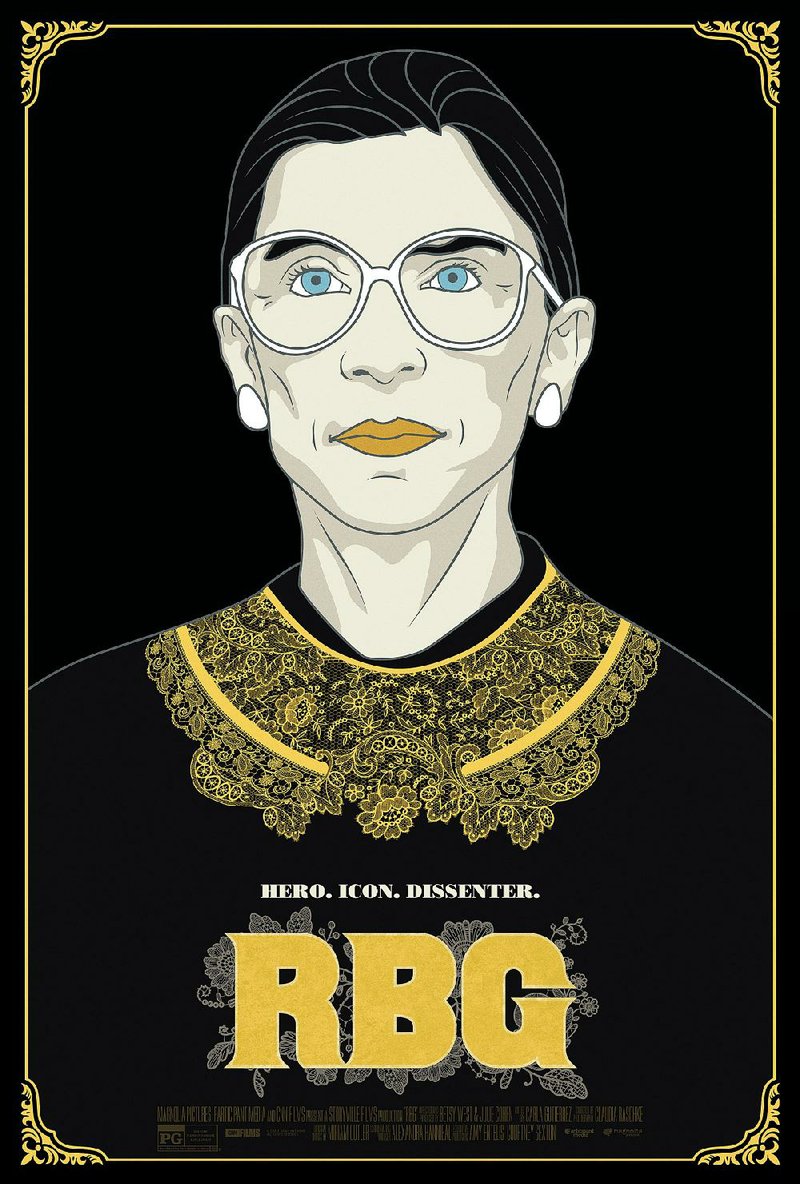It's not often that we as a culture make a lot of fuss about a documentary.
Every few years one pops up -- the first I remember having any commercial thrust was Michael Moore's Roger & Me back in 1989, a cheerful film that used the director's quixotic quest to confront the chairman of General Motors over downsizing policies at the automaker's Flint, Mich., plants to limn a portrait of a devastated and loopily anguished city, personified by a woman (Rhonda Britton) who memorably sold rabbits as "pets or meat." Moore popped up again a few years later with Bowling for Columbine.
RBG
88 Cast: Documentary, with Ruth Bader Ginsburg, Gloria Steinem, Nina Totenberg, Ted Olson, Orrin Hatch, Harry Edwards, Sharron Frontiero, Bill Clinton
Directors: Betsy West, Julie Cohen
Rating: PG, for some thematic elements and language
Running time: 1 hour, 38 minutes
Usually even the most acclaimed and entertaining documentaries find their primary audience on cable channels and streaming services, ceding the cineplexes with the lean-back seats to the candy-colored Hollywood inevitable of the week.
But more people have asked when RBG, an affectionate and -- given the current political climate -- reassuringly gentle look at the unlikely pop icon and second woman appointed to the United States Supreme Court, Ruth Bader Ginsburg, was coming to Arkansas than any other movie this year. A lot of them seemed to suspect it wasn't coming; in the past month I've probably sent 200 emails reassuring people that it in fact was. Now if all of them only go see it in the theater ...
Directed by Betsy West and Julie Cohen, the film never veers too far from what we might think of as the PBS-NPR model of reasonable appreciation, which is to say that while it stops short of hagiography, aside from an opening montage of unnamed (but occasionally recognizable) right-wing voices offering the sonic equivalent of mean tweets aimed at Ginsburg -- Evil-doer, zombie, anti-American -- there's virtually no pushback against the idea of Ginsburg as a kind of secular saint.
In its way, RBG -- the name is derived from Irin Carmon's 2015 book Notorious RBG: The Life and Times of Ruth Bader Ginsburg and plays off the the nom de rap of '90s hip-hop figure the Notorious B.I.G. -- provides the same sort of fan service for progressives as Dinesh D' Souza's odd and ahistoric video polemics provides the "lock her up" crowd.
That's not to suggest any ethical or moral equivalence, for while West and Cohen's politics are overt, they don't engage the same sort of paranoiac hyperbole as D'Souza. Instead they rely on the standard parade of talking heads, archival footage and casual footage to sketch a portrait of a serious, delightfully opinionated 85-year-old who operates without any apparent malice or prejudice. She is willing to take the time to patiently explain her position -- particularly if in a dissent from the majority opinion.
Some may try, but she's as difficult to demonize. To drive home this point, the filmmakers rely heavily on interviews with ideological opposites such as Ted Olson, the United States Solicitor General under President George W. Bush and Orrin Hatch, and make much of her playful, authentic and long-lived friendship with arch-conservative colleague on the court, Justice Antonin Scalia.
For instance, Olson, who was on the losing end of the landmark 1996 case in which the court struck down Virginia Military Institute's policy of not admitting women, describes her as a "worthy and formidable" opponent. In her decision, Ginsburg wrote that, "generalizations 'the way women are,' estimates of what is appropriate for most women, no longer justify denying opportunity to women whose talent and capacity place them outside the average description."
The film is a little light on biographic details. Young Ruth is a pretty, sober-minded Brooklyn kid who marries her college sweetheart Martin Ginsburg, in his own way remarkable, and starts raising a family while at Harvard (and later Columbia) law school, where she encountered a certain skepticism and reluctance to accept her as a serious entity. Despite an exemplary record -- she made the law review of both schools -- she couldn't find a job practicing law after graduating in 1959, because major firms simply wouldn't hire women.
So she taught at Rutgers and began strategically taking on sex discrimination cases, following a template for racial discrimination cases established by Thurgood Marshall and the NAACP after World War II. (For a quick and entertaining refresher on this strategy see last year's Marshall, with Chadwick "Black Panther" Boseman in the starring role.) She helped found the Women's Rights Project at the ACLU.
Here the movie brings in Gloria Steinem and others to drive home the importance of Ginsburg's work in the '60s and '70s, a time when American women could not obtain credit without their husband's co-signature and when it was widely considered impossible for a man to rape his own wife. Ginsburg was perhaps the key figure in bringing American laws in line with the changing attitudes of society.
Before being named to the federal bench by President Jimmy Carter in 1980, she had argued six important sex-discrimination cases in front of the Supreme Court, winning five of them and establishing the legal theory that the equal protection clause of the 14th Amendment ought to apply to women and could be used to remedy discrepancies in hiring, business practices and public policy.
She was kind of a dark horse when President Bill Clinton was considering who to nominate to the Supreme Court in 1993. Until he interviewed her. "I knew within 15 minutes I was going to name her," Clinton says.
But the heart of the movie is its celebration of Ginsburg's unsinkable spirit, which comes through in footage of her working out with her trainer and interacting with her legal scholar granddaughter. She's not zany, she's not some with-it, social-media-savvy creation. She's just a genuinely warm, patient woman maintaining a remarkable intellectual fierceness while commanding the high road in an age of political gutter-wallowing. Even if you disagree with Ginsburg's politics, the film suggests, you're likely to find her gracious, intelligent and difficult to dislike.
She's the sort of hero we need now.
MovieStyle on 06/08/2018


